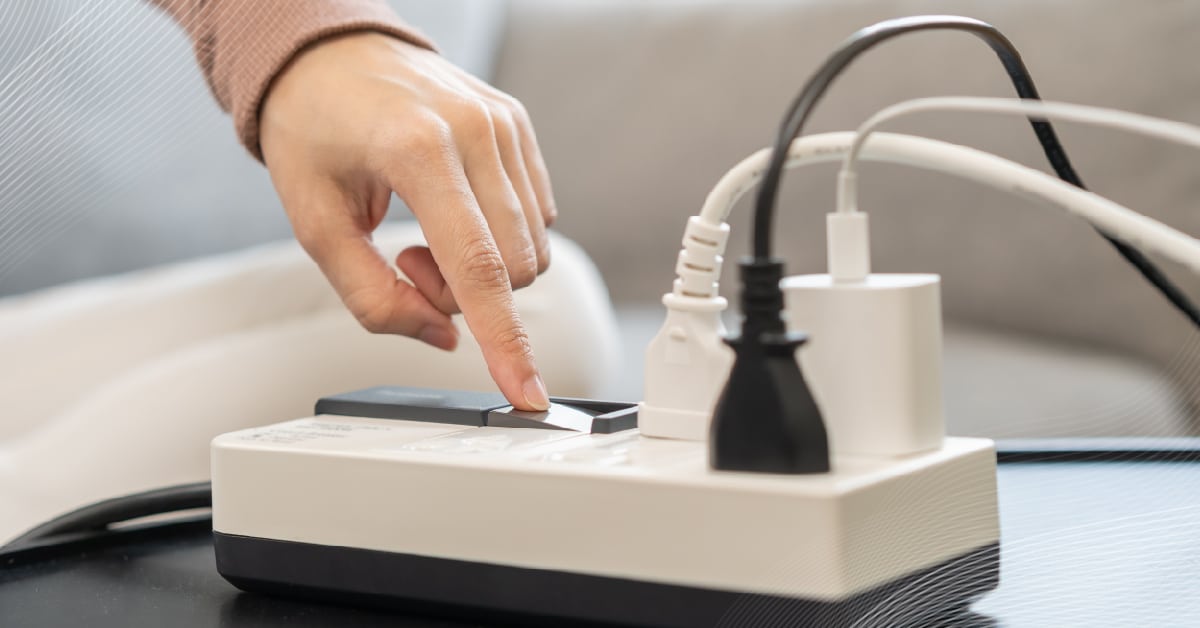Secure Your Home: Electrical Safety Tips and Tricks - NEC Coop
Apr 15, 2024 — Electrical Safety, Resources

Electricity is a marvel that powers our lives, making daily tasks much easier. Imagine not being able to turn on a light at night or use essential appliances like TVs, computers, and kitchen gadgets. These conveniences rely entirely on electricity.
However, this convenience comes with a warning. When not handled with care, electricity can pose serious risks. Mishandling electrical equipment can lead to fires, electrocution, and damage to appliances. Follow these electrical safety tips to ensure you can enjoy the benefits of electricity safely.
Around the House
Our daily routines are intertwined with many electric devices. While these gadgets make life easier, mishandling them could lead to dangerous situations. Here are tips to keep your home safe:
- Inspect cords regularly – Frayed or damaged cords can lead to shocks or fires. Make it a habit to check them and replace any that show signs of wear.
- Use outlet covers – Especially if you have young children, outlet covers prevent curious fingers from exploring dangerous places.
- Keep appliances away from water – Water conducts electricity. Ensure appliances, especially in the kitchen and bathroom, are kept dry and away from sinks or tubs.
- Don’t overload outlets – Plugging too many devices into one outlet can overheat the electrical system. Use power strips with surge protectors instead.
- Unplug unused appliances – Not only does this save energy, but it also reduces the risk of electrical fires.
- Use appliances for their intended purpose – Avoid DIY repairs or using appliances for tasks they weren’t designed for.
- Keep flammable materials away – Ensure curtains, rugs, or any flammable items are kept at a safe distance from heaters or other heat-producing appliances.
- Install smoke detectors – They can alert you to fires, including those caused by electrical faults. Test them regularly.
Plan Your Housework Properly
Awareness of your home’s electrical infrastructure can prevent accidents. Here’s how:
- Know where lines run – Before digging in your yard for gardening or construction, understand where electrical lines are to avoid damaging them.
- Call before You dig – Services can mark the location of underground utilities for free. This simple step can prevent dangerous accidents.
- Keep trees trimmed – Ensure trees near power lines are regularly trimmed to prevent branches from causing disruptions or hazards.
- Report issues promptly – If you notice something off with the power lines, report it to your utility provider immediately.
- Safe DIY practices – When working on home improvement projects, always turn off the power to the area you’re working on.
- Use insulated tools – For any electrical work, insulated tools provide an extra layer of protection against electric shock.
- Wear protective gear – Rubber-soled shoes and gloves can reduce the risk of electrical shock.
- Educate your family – Make sure everyone in your household knows the basics of electrical safety.
Avoid Power Lines
The power carried through lines is more than enough to be lethal. Keep these precautions in mind:
- Look up – Always be aware of overhead lines when using ladders, pruning trees, or carrying long objects.
- Maintain a safe distance – Stay at least 10 feet away from power lines to avoid accidental contact.
- Never touch downed power lines – Assume any downed line is live. Report it to authorities immediately.
- Be cautious with ladders – Even non-metal ladders can conduct electricity if wet or dirty. Check your surroundings before using one.
- Avoid flying kites near lines – A fun activity can turn dangerous if a kite gets caught in power lines.
- Don’t climb trees near power lines – Even if lines aren’t touching the tree, they can transmit electricity through the air.
- Be careful with pools and trampolines – Place them away from overhead lines to prevent accidents.
- Respect barriers and signs – They are there for your safety, especially near substations or transformers.
Avoid Danger Zones
Even with diligent safety practices at home, external factors can introduce risks:
- Stay inside during storms – If power lines are damaged during a storm, it’s safer to stay indoors until the danger has passed.
- Report and avoid flooded areas – Water can conduct electricity from underground or downed lines.
- Exercise caution after a storm – Wait for the all-clear from authorities before venturing outside, as downed lines can be hidden by debris.
- Don’t attempt to remove debris near lines – Let professionals handle it. They have the proper equipment and training.
- Educate yourself on power outage safety – Know what to do in an outage to prevent accidents when power is restored.
- Avoid touching fences near downed lines – Metal fences can conduct electricity from a downed line across a long distance.
- Keep a safe distance from transformers and substations – These are high-voltage areas that require professional handling.
- Follow guidance during evacuations – If you’re directed to leave your home due to nearby electrical hazards, follow instructions carefully for your safety.
Electricity, when respected and properly managed, is a powerful tool that enhances our lives. By following these simple yet effective electrical safety tips, you can ensure your home remains a safe space for your family. Remember, safety starts with awareness and a proactive approach to managing the electrical systems and devices in our homes. Stay safe!
Sources:
“Electrical Safety While Working From Home,” Electrical Safety Foundation, https://www.esfi.org/electrical-safety-while-working-from-home/
“Downed Power Line Safety,” Electrical Safety Foundation, https://www.esfi.org/downed-power-line-safety-always-assume-downed-lines-are-live/
“Call Before You Dig,” Washington Utilities and Transportation Commission, https://www.utc.wa.gov/public-safety/pipeline-safety/call-you-dig
“How insulated tools work,” Fluke, https://www.fluke.com/en-ph/learn/blog/electrical/what-are-insulated-tools
“Protect Yourself and Others from Electrical Hazards After a Disaster,” Centers for Disease Control and Prevention, https://www.cdc.gov/disasters/electrical.html

